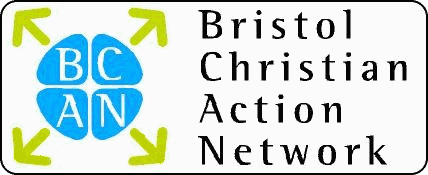 BCAN (Bristol Christian
Action Network)
BCAN (Bristol Christian
Action Network)Helping Christians Respond To Social Needs Bristol Homeless Forum
|
IntroductionThere is a great deal about homelessness on the Internet. This page contains some links to some of the more significant reports. CrisisTo download you will have to complete a short registration process to set up a user name and password. Life on the Margins: The experiences of homeless people living in squats (March 2004, 70 pages). The latest research report in the Hidden Homelessness series looks at the prevalence and experiences of homeless people living in squats because they have no other option. The report reveals that homeless people who squat are a particularly vulnerable section of the homeless population.
DCLGThe Department for Communities and Local Government has a Ministerial Working Group on Homelessness which brings together eight Government departments to tackle the complex causes of homelessness - not only housing, but also health, work and training. This plan sets out six joint commitments that means the departments will all work together to give local people the tools to tackle rough sleeping and put an end to second nights out on the street. It is the first report from the Ministerial Working Group.
ESRCThe 'Multiple Exclusion Homelessness Across the UK: A Quantitative Survey' project was funded by the Economic and Social Research Council (ESRC). It was one of four projects supported by the Multiple Exclusion Homelessness Research Programme, established in 2008 as a partnership between the ESRC, Joseph Rowntree Foundation, the Department for Communities and Local Government, Homeless Link and the Tenant Services Authority. The overall aim of this project was to provide a statistically robust account of the nature and patterns of multiple exclusion homelessness (MEH) across the UK. MEH was defined as follows: People have experienced MEH if they have been 'homeless' (including experience of temporary/unsuitable accommodation as well as sleeping rough) and have also experienced one or more of the following other domains of 'deep social exclusion': 'institutional care' (prison, local authority care, mental health hospitals or wards); 'substance misuse' (drug, alcohol, solvent or gas misuse); or participation in 'street culture activities' (begging, street drinking, 'survival' shoplifting or sex work). A multi-stage quantitative survey was conducted amongst users of 'low threshold' homelessness and other services in seven UK cities, and key findings were as follows:
Multiple Exclusion Homelessness reports so far published include:
Salvation ArmyThese are a series of research reports from the Henley Centre and The Salvation Army, commissioned by The Salvation Army (UK). The Responsibility Gap (2003). Following on from the ground-breaking reports on social and economic issues facing Britain today, this new research focuses on the dominant themes of community, individuality and responsibility. A key concern to emerge is the growing 'responsibility gap' in British society.
The Burden of Youth (2001). An independent report on the major social issues facing young people in the UK today.
The Paradox of Prosperity (1999). A ground-breaking independent report on major social issues facing The Salvation Army in the UK in the next ten years.
The Seeds of Exclusion (2008). The Salvation Army has produced The Seeds of Exclusion report in order to understand the indicators in early life which can lead to future problems of social exclusion and to understand the nature, complexity and severity of problems facing people in Salvation Army homeless centres.
New Philanthropy CapitalThey provide independent research and advice about charitable issues. This report on homelessness was published in June 2008. The typical image of a homeless person is an old man sleeping on the streets. But homelessness is not just about rough sleepers. For every known rough sleeper, there are around 100 people in hostels. Many of these people face a number of problems like family breakdown, poor mental health, and unemployment. Lost property, NPC's report on homelessness, argues that the problem is about much more than not having a roof overhead. It highlights charities working to prevent people becoming homeless, as well those helping people to rebuild their lives and find a route out of homelessness. To download you will have to complete a short registration process to set up a user name and password. |
||